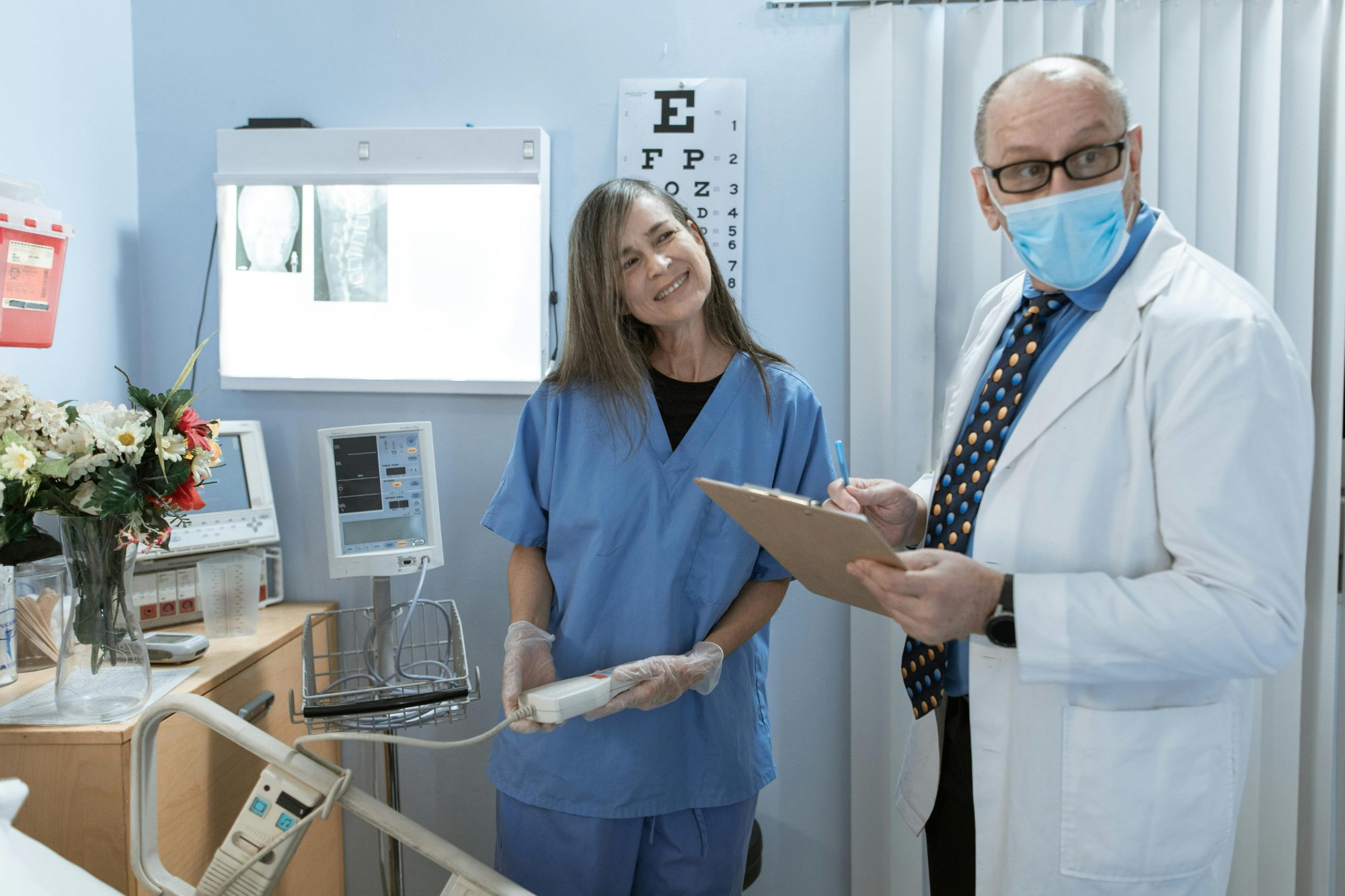LPN Jobs & Careers: What Can LPNs Do & Where Can They Work?

Whether you are thinking of becoming a licensed practical nurse or you already are one, the available jobs and career paths will greatly inform your decision.
LPNs are important in the healthcare field and positively impact the lives of patients and their families alike. They also have a complex and multifaceted role that can complete a wide range of tasks in many work settings. However, not all types of LPN jobs will provide the same level of satisfaction, and choosing the right path can make the difference between pursuing a nursing career and becoming disillusioned.
Because we want to support you in your LPN career, we will provide you with a guide to the most popular practical nursing careers, roles, and work settings, as well as the responsibilities they require from their applicants and their job and salary benefits.
Here is all you need to know about what LPNs can do, where they work, and the expected compensation in each work setting:

What Is an LPN?
A licensed practical nurse (LPN) is a type of healthcare professional who provides basic care and support to patients in need. They can work in various environments in roles that are at the forefront of caregiving, often completing highly practical tasks. However, no matter their workplace or the task completed, LPNs need to be supervised by other nursing staff members, such as registered nurses (RNs), physicians, nurse practitioners (NPs), or doctors.
To become an LPN, you need to attend a Practical Nursing (PN) Diploma program and sit the NCLEX-PN exam. The program generally takes 12 months to complete, and it involves theoretical instruction as well as practical experience. PN Diploma programs are available in colleges, vocational schools, and some healthcare institutions. Depending on your chosen program, you can attend it fully offline or partially online within a hybrid model.
Read our guide to the LPN role to discover all the facts about the expected tasks, responsibilities, and benefits of becoming a licensed practical nurse.
LPN Job Description
Your responsibilities and duties in LPN jobs will involve a variety of tasks, such as monitoring patient health, administering primary care, ensuring comfort to patients, talking to them, ensuring they take their medication on time, and providing explanations for the treatment each patient receives.
You will also have to keep a clear line of communication with patients, their families, and other nurses alike. Given the supervision and constant synchronization with other nurses, licensed practical nurses must also keep clear and accurate records of patient's health and report to RNs or other staff in due time.
Considering that, as an LPN, you are often the first to encounter and deal with patients, you also need to present a series of soft skills to be proficient in your field. First of all, you must prove your ability to engage with and provide care to a wide array of patients with varying backgrounds and needs. You will also need to maintain good relations with your coworkers and supervisors. A proactive and communicative attitude is also a great plus that you can bring to your workplace as a licensed practical nurse.
If you fulfill a majority of these requirements and are ready to have a positive impact on the lives of your patients and their relatives, the LPN role is right for you.
Enrolling in the right PN Diploma program is the first step to starting your LPN career. If you begin studying at Nightingale College, you have the benefit of completing all your didactic instruction online, along with supervised on-ground field experience, for maximum convenience and accessibility. Our program will prepare you to sit the NCLEX-PN and demonstrate quality, competent, and client-centered care in a future work environment in as few as 12 months.
Take the first step in your LPN career with our PN Diploma Program! Send in your application!

LPN Career Options Overview
These are the main job opportunities available to a licensed practical nurse, as well as their job environment, responsibilities, and average salary per year, according to the latest Occupational Employment and Wage Statistics (OES) report from the Bureau of Labor Statistics (BLS). While all require you to fulfill the LPN job description, their obligations, place of work, and salary benefits vary and should inform your career choice.
|
LPN Job |
Place of work |
Average Salary per Year |
Main Responsibilities |
|
Hospital LPN |
General medical and surgical hospitals |
$51,360 |
Taking vital signs, managing and handling patients |
|
Nursing home LPN |
Nursing homes, Residential care facilities |
$58,440 |
Giving medication, keeping patient records, providing basic care and comfort |
|
Hospice LPN |
Continuing care retirement communities and assisted living facilities for the elderly |
$56,830 |
Giving medications, providing basic care and comfort, attending to elderly patients in day-to-day tasks |
|
Physician LPN assistant |
Physicians’ offices |
$49,660 |
Taking vital signs, administering immunization shots, documenting patient states |
|
Various government LPN specialties |
Correctional, military, or other government facilities |
$57,200 |
Routine healthcare tasks and emergency response, depending on the facility |
|
Correctional LPN |
Correctional facilities |
$61,858 |
Routine healthcare tasks, emergency response, redacting patient documentation |
|
School LPN |
Schools, Educational facilities |
$55,463 |
Maintaining student and staff health through examinations, education, and guidance |
|
Clinic LPN |
Health practitioners’ offices, general and specialty clinics, medical and diagnostic labs |
$53,385 |
Taking vital signs, dispensing and administering medications, performing IV shots, managing patients' cases |
|
Mental or behavioral health LPN |
Mental health, residential intellectual, developmental disabilities, and substance abuse facilities |
$52,233 |
Taking vital signs, giving medications, documenting patients’ condition, providing care to patients in distress |
|
Insurance consultant LPN |
Insurance carriers |
$57,696 |
Documenting clients’ status, conducting interviews, providing consultancy on claims |
|
Traveling nurse |
At-home nursing services |
$53,305 |
Offering at-home care, implementing healthcare plans, educating patients |
|
Home health nurse |
Home healthcare services, personal care services |
$56,370 |
Offering at-home care, implementing healthcare plans, educating patients |
 1. Hospital LPN Career Options
1. Hospital LPN Career Options
State, local, and private hospitals are popular career options, accounting for approximately 15% of all LPN jobs. If you prefer working a job where you advance your general knowledge and experience in a fast-paced environment, hospitals are the choice for you. However, remember that the hospital LPN role is more medically intense.
The main advantage of starting to work in a hospital environment is that you have the opportunity of learning from professionals, as well as encountering a variety of medical scenarios that can inform your later career choices.

2. Nursing Home & Residential Care LPN Jobs
Nursing homes and residential care facilities are the biggest employers for LPNs, with 35% of all jobs, or 229,250 positions, being provided there. These settings are also good for developing experience caring for older patients, making them an essential starting point if you are thinking of a career as a geriatric nurse.
Compared to a hospital environment, nursing home and residential care settings are less demanding on the medical side but will require you to showcase patience and understanding towards your elderly patients.

3. Hospice Healthcare LPN Career Path
LPN jobs in hospice healthcare are similar to nursing homes or residential care positions, with the added responsibility of providing comfort to patients suffering from a terminal illness, as well as managing the health and psychological impact of such conditions.
Although your main tasks will still involve providing comfort and helping patients with day-to-day activities, the specific nature of your work demands that you demonstrate more patience and support than in other work settings.
If you want to become a hospice nurse down the road, it is worth pursuing this LPN career as soon as you can.

4. Working as an LPN in Physicians’ Offices
Physicians’ offices provide the medical industry with 12% of LPN jobs, making them some of the most popular work settings. As an LPN career, working under the supervision and guidance of a physician can provide you with similar medical experience that you get in a hospital setting but with a lesser workload. Physicians' offices often have more tight-knit teams and can prove more formative for you going forward.
The main drawback is that, on average, practical nursing careers in physicians' offices pay lower salaries than those in most other work settings.

5. Government LPN Career Options
As a licensed practical nurse, you can start working in various government-run settings, such as state or federal correctional institutions or military facilities. Government positions represent approximately 6% of all LPN jobs in the US and are also some of the best-paid options for your level of education in the industry.
Your tasks will vary depending on your chosen branch and the needs of your specific patients. Many government jobs can provide the formation and opportunities for your LPN career and later advancement path. For instance, if you want to pursue a long-term career in military nursing, you should consider working in a military setting as early as possible.
6. Correctional LPN Job Opportunities
You can find LPN jobs in many other types of non-governmental private correctional facilities, where you will perform tasks and have duties similar to other general healthcare environments. However, the added stress of working with inmates can deter many from such positions.
If you can manage a stressful environment and the added risks of a correctional LPN career, you can see considerable salary benefits, with a lower level of competition for available positions. As for advancement opportunities, jobs in correctional facilities provide a general level of experience and knowledge, making them candidates if you do not intend to specialize in a specific direction yet.

7. School Jobs for LPNs
Starting an LPN career in a school environment can open a variety of advancement opportunities, allowing you to accumulate a type of medical experience that you would not receive in any other setting.
Working in schools as an LPN entails assisting students and educational staff in achieving and maintaining personal and collective health through examinations, education, and guidance. You will be the first medical professional that students, teachers, and other personnel will go to when facing a medical issue at school. Additionally, you will perform routine checks meant to ensure health standards at the level of collectivity.
As far as advancing your career goes, working in a school setting will prepare you to pursue formation as a fully instated school nurse once you receive your RN accreditation. Additionally, since they involve extensive work with children and youth, school LPN jobs can also provide valuable knowledge and experience in pediatric nursing.

8. Finding Work in Clinics as an LPN
Job opportunities for LPNs in clinics can provide you with priceless experience for the directions your career will take later on. You will work in collaboration with other nurses, practitioners, and clinicians under the supervision of a registered nurse or physician, with responsibilities varying based on whether your workplace of choice is a general or specialty clinic.
In many ways, similar to working in a physician's office or a hospital setting, a general clinic can provide general medical experience. On the other hand, a specialty clinic can direct your formation towards a specific position later on, such as becoming a dermatology nurse, an oncology nurse, a cardiac nurse, a dialysis nurse, or a neonatal nurse. If your role in the clinic you are working in involves management tasks, you will also receive the experiential preparation for a nurse case manager role.
Choosing the right clinic will be the most important decision for your LPN career and future opportunities. However, working in a general clinic can also inform your choice if you are undecided about a specialization.

9. Mental Health Practical Nurse Career Options
Fully working in a psychiatric or mental health facility is only possible once you get your master’s degree in nursing. Still, if you start working in these facilities as an LPN, you will have an easier time when pursuing your further education and formation.
LPN jobs can be found in psychiatric wards or psychiatrists' offices. Your resulting responsibilities will differ depending on your employer. In all cases, however, you will have the opportunity to become accustomed to the type of practice and essential concepts early on.

10. Working as an LPN for Insurance Companies
If you are considering your alternative nursing career options, working in an insurance company is one of the more popular ones out there. You can also find LPN jobs in the insurance sector.
As a medical professional working with an insurance firm, your responsibilities will be considerably different from those you would expect in a medical environment. Your tasks will include making healthcare assessments, consulting and evaluating a client's documentation, and offering insight into the viability of specific insurance processes and policies on a case-by-case basis. One of the main benefits is that LPN jobs in insurance are also often work-from-home nursing positions, making them ideal if you value flexibility.
Additionally, depending on the insurance agency you will be working on, your experience may prepare you to specialize to become an occupational health nurse down the road.

11. Traveling LPN Jobs
Travel nursing is one of the most sought after careers in the healthcare industry, also representing some of the highest paying nursing jobs out there. And, while most traveling nurse positions require you to be a registered nurse or higher, you can get a head start, by beginning your LPN career in the travel nursing industry.
This job option will involve a variety of tasks and healthcare situations, as you will treat a wide array of patients with various medical conditions. As the name implies, you will also have to constantly change your work environment and travel to the residence of your patients. Working as a traveling nurse can prove hectic, and your yearly salary will depend on the consistency of your appointments. Additionally, as a licensed practical nurse, you will need to have supervision and may require additional training and certifications for specific tasks.
However, starting a traveling LPN career can train you for more independent practice and also offer you a more flexible employment option.

12. Working in Home Healthcare Services
With the home healthcare sector growing with the adoption of new remote monitoring technologies and the increasing appeal of at-home treatment for aging patients, home health LPN jobs are booming, with 85,150, or 13% of all US licensed practical nurses working in the sector.
As a home health LPN, you would be responsible for implementing treatment plans as redacted and according to the indications of registered nurses, doctors, or other nursing staff. Your day-to-day tasks will include administering medicine, drawing blood or collecting other samples, inserting catheters, and informing patients and other caregivers about their treatment. You would additionally provide day-to-day care and support meant to increase your patients’ quality of life and service.
Although home health LPN jobs generally showcase a flexible work schedule, you will have more stability than in a traveling LPN career. This is because home health nurses work for agencies rather than being independent contractors. One commonality is that you would often be paid per case rather than per hour, thus making salary estimations dependent on your performance.

Salary Expectations According to the LPN Career Path
The appeal of your LPN career of choice may also depend on the expected salary of your future position. According to the BLS, licensed practical nurses receive a median salary of $54,620 per year on a national level. However, this payment estimate does not account for the industry you will work in nor for the specific role you will fulfill. Here is how your annual salary may vary depending on the industry of your prospective LPN career:
- Skilled nursing care facilities – $58,440
- Residential care facilities – $53,500
- Continuing care retirement communities and assisted living facilities for the elderly – $56,830
- General medical and surgical hospitals (state, local, and private) – $51,360
- Specialty hospitals (except psychiatric and substance abuse) – $57,760
- Home health care services – $56,370
- Mental health facilities (including intellectual, developmental disability, and substance abuse) – $55,840
- Psychiatric and substance abuse hospitals – $55,740
- Physicians’ offices – $49,660
- Dentists’ offices – $63,990
- Health practitioners’ offices – $52,690
- Medical and diagnostic laboratories – $54,080
- Outpatient care centers – $61,610
- Employment services – $64,660
- Insurance carriers – $65,170
- Personal care services – $90,950
- Social assistance services – $52,430
Your performance and experience in various LPN jobs will also have an impact on your salary. If you are among the highest 10% of earners, you can expect to earn more than $72,650 per year. Comparatively, the lowest 10% of LPNs earn, on average, less than $40,490 per year.
A final and decisive factor for your salary as a licensed practical nurse is the area you work in. Read our LPN salaries by state study to understand how your location can affect your payment prospects.\

Where Do LPNs Work: Job Outlook per Workplace
If, before the pandemic, the healthcare industry faced a push for more BSN graduates in nursing, the ensuing nursing shortage, as well as the nursing burnout of currently practicing staff resulted in a hiking demand for licensed practical nurses. Additionally, the continuing increase of the aging population further exacerbates the requirement for entry-level, highly practical nursing staff that can provide basic care and assistance in various environments.
The employment of licensed practical nurses is projected to increase by 5% through 2032, amounting to 34,900 new LPN jobs by the end of the decade, in addition to the existing 655,000 positions. This is an increase from the 0.7% employment rise for LPNs estimated by the BLS in 2019. On average, you will find around 54,400 LPN job openings each year.
More and more healthcare industries choose to supplement their positions with licensed practical nurses, which results in more opportunities for your LPN career in diverse areas of practice. Here are the most frequent work environments for LPNs, according to the latest data by the BLS:
- Nursing and residential care facilities (including skilled nursing) – 35%
- State, local, and private hospitals (including general, surgical, and specialty) – 15%
- Home healthcare services – 13%
- Physicians’ offices – 12%
- Government jobs – 6%

Nursing Career Advancement Options
While the licensed practical nurse role may offer many benefits and considerable career fulfillment, it also comes with opportunities for advancing your career in nursing.
As you have seen, choosing where you work as an LPN can inform your future career choice, the ease of advancing to a particular position, and your overall eligibility. Various LPN jobs can provide priceless practical experience that you cannot make up for entirely through education.
However, as far as education and accreditation goes, the main option is advancing from LPN to RN, by getting an ADN or earning your BSN degree, and then sitting the NCLEX-RN.
If you are undecided on whether you should advance to a registered nurse position, read our complete LPN vs. RN comparison.
Both levels of education qualify you as a registered nurse. However, they showcase different benefits and drawbacks.
A Bachelor of Science in Nursing is generally better regarded. Its educational requirements and curriculum are more comprehensive, and the degree qualifies you for the highest-paying jobs in the industry, as well as for advancing your career further by earning a Master of Science in Nursing (MSN) and becoming a nurse practitioner (NP). However, BSN programs are more expensive and require at least 3 years of full-time learning. While you have the option of a more convenient hybrid BSN program that allows you to complete your theoretical learning online, all such options require more commitment on your side.
ADN and ASN programs are generally cheaper and only require a maximum of 2 years to prepare you to work as a registered nurse fully. Although you will still need your BSN to further your education, you can earn your degree later on through an accelerated RN-to-BSN bridge program.
Additionally, if you are already a licensed practical nurse, you can advance to the RN position in as few as 16 months with a bridge program. The LPN-to-ASN track at Nightingale College aims to provide the most convenient and accessible learning option by combining online didactic instruction with on-ground supervised field practice to fully prepare you to take the NCLEX-RN.
Advance your career with our LPN-to-ASN program!

Earning Certifications as an LPN
If you do not want to commit to an educational program, you can still advance your LPN career without earning another degree by getting various certifications that expand your scope of practice. These are the most popular types of accreditations that can expand your LPN career options:
- IV therapy certification – permits you to administer medication intravenously, preparing you for more autonomous LPN jobs.
- Long-term care certification – ensures you can provide care in long-term care facilities, making it ideal for nursing care positions.
- Initial gerontology certification – proves you have the knowledge and skills to care for the older population.
- Wound care certification – prepares you to clean and dress wounds, being recommended if you want to want an LPN career in hospitals.
LPN Career FAQs
What Jobs Can LPNs Do?
Licensed practical nurses can fulfill a wide variety of roles in different work environments, from general or specialty hospitals, to hospices, nursing homes, government facilities, clinics, and physicians’ offices. LPNs can also provide home care services and work as travel nurses. Generally, most types of LPN jobs will involve providing basic care and comfort to patients, as well as helping them in their daily activities. However, all licensed practical nurses must perform their duties under the supervision and direction of other staff members, including registered nurses, doctors, or physicians.
Where Can LPNs Work?
Given their general and practical preparation, licensed practical nurses can occupy positions in a broad range of healthcare settings. They generally work in facilities that attend to older populations (continuing care retirement communities, assisted living facilities, and nursing and residential care facilities), but can also start a career in hospital settings, clinics, or physicians’ offices.
A consequence of the ongoing nursing shortage is that you can find licensed practical nurses in almost all healthcare environments, from psychiatric care units to correctional facilities, dentists’ offices and even military facilities. Additionally, LPNs can start a career in industries unrelated to healthcare, such as in insurance.
Where Do Most LPN Nurses Work?
Most licensed practical nurses (35%) are employed in nursing and residential care facilities, followed by hospitals (15%), home healthcare services (13%), and physicians’ offices (12%). An additional 6% of LPN jobs are in government facilities.
What Is the Highest Paying Job for LPN?
According to the BLS, the best paying LPN jobs are, on average, in nursing and residential care with an average annual salary of $58,140. However, a correctional LPN career can nominally bring in more per year, with an estimated salary of $61,858. Additionally, although LPNs make up a fraction of all personnel in the personal care services industry, they can earn up to $90,950 per year.
What Is the Most An LPN Can Make In an Hour?
According to the most recent data, the 10% highest earners among LPNs earn more than $35 per hour, or around $9 more than the median hourly pay.
Where Do Licensed Practical Nurses Make the Most Money?
According to the LPN salary by state study, the states where licensed practical nurses are paid the most are Washington ($69,950 per year), California ($69,930 per year), and Massachusetts ($68,170 per year).
Additionally, the top-paying metropolitan areas for LPNS are San Jose-Sunnyvale-Santa Clara, California ($80,590 per year) and San Francisco-Oakland-Hayward, California ($80,470 per year), with the best-paying city being Soledad, California ($91,386 per year).
What Can LPNs Not Do?
Generally, a licensed practical nurse cannot diagnose a medical condition, prescribe medication, or perform medical tasks autonomously and without the supervision or direction of other nurses. Additionally, the LPN role has other specific limitations on duties, but these can vary depending on your state and place of work. You can also earn certifications for many such tasks.
What Is the Lowest Paid LPN?
The lowest 10% of LPN earners have a salary lower than $40,490 per year, or approximately $19.5 per hour. Judging by industry, a job in a physician’s office comes with the lowest yearly salary (between $48,300 and $49,660) for a licensed practical nurse.
What Is the Shortest Time to Become an LPN?
The shortest period required to become a licensed practical nurse is 12 months, by attending a PN Diploma program and taking the NCLEX-PN.
If you enroll at Nightingale College, you have the benefit of a hybrid program that combines fully online didactic instruction with on-ground supervised field experience to provide the most convenient and accessible learning option for aspiring candidates.
Start your LPN career with our PN Diploma program! Send in your application today!

